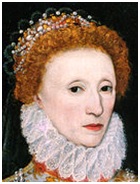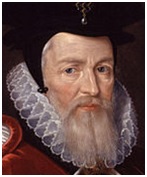|
 |
|
 |
Elizabeth I Leadership
Elizabeth I (1533-1603)
Voted Britain’s greatest monarch by the BBC’s Great Britons poll in 2001. She (pictured right) made Protestant England a much stronger and safer country threatened by its powerful Catholic enemies like Spain and France. The daughter of Henry VIII and Anne Boleyn, she became queen in 1558.
Why was she a great leader?
1. Love and unity She always mixed with ordinary people, loving and serving them with great love and trust. In return the people loved and trusted her. Despite her occasional bad temper, she was charming with a wonderful smile and sacrificed marriage to avoid male interference, becoming known as the “Virgin Queen”. This gave her the image of eternal youth and self-sacrifice, which she and her ministers encouraged.
2. Courage, determination and great speeches As the Spanish Armada (pictured right) approached to invade England in 1588, she visited her army at Tilbury, despite fears for her safety. There she gave one of the greatest inspirational speeches, saying she would live and die for the English people: “I know I have the body of a weak and feeble woman, but I have the heart and stomach of a king”, she said. She was incredibly determined to do the right thing and meet people, despite the constant fear of assassination by Catholics. 3. Effective She made her government very effective. How?
4. Prepared to change She changed her policies, when necessary, after much thought and discussion. She kept her private opinions to herself, sometimes making concessions but always keeping the good things of the past like Parliament and the courts.
5. Religious toleration She loathed religious bigotry and dogmatism. She created a Protestant church mixed with some Roman Catholicism. She did not want to make “windows into men’s souls” to find out their religion and then persecute them for it.
6. Fun She was popular because of her sense of fun, humour and love of the arts. She resisted the Puritans’ attempts to close the London theatres. Instead she liked and encouraged Elizabethan musicians and writers such as Shakespeare. Falstaff, in his play Henry IV, was her favourite character. This allowed her to relax from her stressful job.
7. Kind but tough She was compassionate and agonized over executions, particularly of her cousin, Mary Queen of Scots (pictured right), even though she was plotting against her. But she was also very tough and able to take difficult decisions. She drove her employees very hard and knew when to forgive or fire them. She also had a reputation for meanness (because the royal finances were poor) and crushed the Catholic rebellion of 1569, executing 450 rebels.
8. Peacemaker Despite being Protestant, she made a big effort to make peace with her Roman Catholic enemies. She kept countries happy by promising to marry their princes, before eventually turning them down.
9. Learning and intelligence She was very intelligent, fluent in French and Italian, and always prepared to learn from new ideas and opinions.
10. Image conscious She piled on the make-up and wore a wig as she got older to appear ageless (her motto was “ever the same”). She executed the Earl of Essex (pictured right) for bursting into her private chamber and seeing her wigless and toothless!
Key quotes on leadership Her Golden Speech to Parliament in 1601 has three great quotes: You may have many a wiser prince, sitting in this seat, but you never had, or shall have, any who loves you better To be a king and wear a crown is a thing more glorious to them that see it than it is pleasant to them that bear it. Though God has raised me high, yet this I count the glory of my crown: that I have reigned with your loves. |
|
|
||
|
|
|
||
|
||
| Copyright © wisdomtowin.com All Rights Reserved | ||
|





